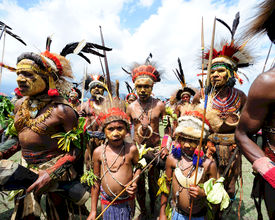Here's a universal truth: you can plan and run an event without caring about building a community. But if you're using events as a marketing tool and you ignore the necessity of growing a community around your brand, services, or products, then you can forget about positive ROI.
According to organizational development consultant Brook Manville, "Creating a community means getting participants to think and act collectively, to set aside (or find ways to align) their own interests in favor of a common purpose, and to accept a degree of accountability."
You need a tribe to connect with in a positive way by providing meaning around your product (or services) and events. This is how you’ll add incredible value to others, increase your brand’s awareness, and attract new people. And if your intention is to run multiple events, then you should think about creating a tribe right away.
Luckily, you can start by building an online community, which subsequently may take the analog format during your events. According to social media expert Sofie Verhalle's interview with eventplanner.tv, everything begins with that first 'like'." However, she goes on to argue, "the like itself doesn’t have any value unless you get the engagement."
So how can you do that? Here’s a list of steps on how to build a community around your event and brand:
Step 1. Run events that are worth building a community around
As Guy Kawasaki notes, "it’s hard to build a community around mundane and mediocre crap no matter how hard you try." On the other hand, he observes, if you have something awesome to offer, "You may not be able to stop a community from forming even if you tried."
So instead of designing the concept of your event and then obsessing over how to build a tribe, focus on coming up with an event theme or cause that will thrill your potential attendees and make them want to be part of something bigger. Think about Burning Man, the annual gathering in Black Rock City, Nevada. On Twitter alone, it has more than 115,000 followers, not to mention endless YouTube videos, Facebook and Instagram followers, articles, and blog posts from previous attendees.
Step 2. Create a private or secret group on Facebook
Some people embrace the idea of being part of an exclusive community. A private group also gives members a safe space to post, comment, and share freely without feeling exposed.
Step 3. Set up informal contexts (before the event) for people to gather and interact
According to entrepreneur David Spinks, "In-person and live online experiences create stronger bonds." So if you plan an international conference or workshop, for example, invite people a few days before the event and introduce them to the area through different informal activities such as a guided tour, hiking, etc. This way, you’ll strengthen the relationship between the guests and create common ground for a future event community.
Step 4. Incentivize guests' participation and engagement
In any community, some members are more active than others. If you notice people engaging with the event cause (through posting comments on social media, writing blog posts, sharing their thoughts, etc.), don’t hesitate to give them a shout out or send them an event bonus discount. You'll reinforce engagement and encourage other community members to participate more actively.
Step 5. Crowdsource the event concept and format
As Kawasaki pinpoints, it's important to “give people something concrete to chew on.” Motivate the attendees to participate at the design of the event by outsourcing the program structure, event topics, and social activities. Make them feel part of something bigger and encourage them to work together on an initiative (in this case, the upcoming event’s concept and structure).
Final thoughts
Building an engaging community around your event can have powerful marketing outcomes. You’ll achieve a stronger connection between your brand and your attendees (potential leads). By laying the groundwork for interaction and engagement between your (future) event guests, you’ll increase your trustworthiness as a brand and add incredible value to your followers. So wait no more - start building your event community today!








